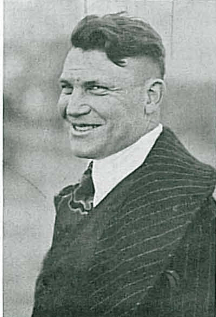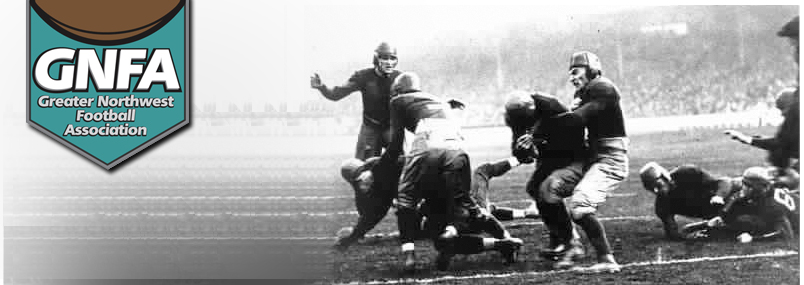|

Raymond Vincent Borleske
Seattle Athletic Club / Washington
Athletic Club
Halfback
1911-1912
"Banned" by the PN-AAU
1913
From 1907 to 1910 Vincent "Nig" Borleske was considered the
greatest sensation in Northwest college football ever put
out while at Whitman College. Pretty high praise for
the Spokane athlete who was never picked for the high school
all-star team. During those days, high school was an
on-again, off-again affair for the tough speedster. It
wasn't until he started attending Blair Business College, a
pseudo-prep school created by Hugh C. Blair in 1897 for
"practical eduction", that his legend took off. The
football team at BBB was a recruiting tool for attendees to
learn a skill as an alternative to the changing public
education system and Vincent showed his first glimpses of
greatness while captaining the Blair baseball team in the
spring of 1905 and as a hard tackling 18-year old defender
in the fall.
In one game against Idaho University it was reported that
"Nig" got away on six or seven runs of over 30 yards, scored
four touchdowns and kicked two goals from placement, himself
accounting for 26 of Whitman's 30 points. Walter Camp placed
Borleske as an honorable mention All-American, while
Northwest writers balked "at Harvard or Yale there would be
little doubt of his name being on the top of the list, he
was attending too little of a school for the east coasters".
He would be the first "western" U.S. player named to Walter
Camp's All-America teams.
Labeled the best halfback, hardest line hitters and surest
punt catchers by pundits, Borleske was not only highly
sought after on the gridiron, but on the baseball diamond as
well holding down 3rd base and pitching for Whitman.
Those baseball skills would take him to the Brandon Angels
and Edmonton Grey Birds of the Western Canada League in 1911
and 1912, during his off-season from football. This
would come back to be a problem for the "amateur" club
teams.
After graduating from Whitman, Vincent took the reigns of
the Broadway High School team in Seattle and was courted by
every major football club in the northwest with the Seattle
Athletic Club winning his services for 1911.
Borleske was such a force with the Seattle Athletic Club,
after averaging over 20 yards per punt return against the
Multnomah Athletic Club, perennial west coast champions and
able to dominate Oregon colleges, the MAAC petitioned to
have him banned from play due to his "professional" baseball
status in the return match-up slated for New Years Day 1912.
The Seattle Athletic Club would change to the "Washington
Athletic Club" for the 1912 season in response to the MAAC
charge and away from the AAU umbrella, set out to dethrone
the Winged M's and Borleske returned in better shape than
ever. And the MAAC loaded up with "ringers" as well.
Students of history will recall this was the era of
targeting opposing players and "taking out" the stars was
not uncommon. Borleske had a big target on him, and it
wouldn't be the first time. Against Washington State
College as a senior, Vincent lay on the field unconscious
four times and four times revived to carry on. With
two minutes left in the game, Borleske picked up a Cougar
fumble and ran 95-yards for a touchdown. Four Cougars
were carried off the field unconscious after the play, the
result of chins meeting a brutal shoulder or elbow from
Vincent.
When Multnomah and Washington lined up the hits were
on...literally. Fists were flying 10 seconds before
the final whistle with Multnomah players suffering from many
injuries. The game ended in a tie, but Vincent was the
star of the game according to the Tacoma Ledger.
After leaving in the second quarter with another concussion,
Vincent returned to rush 18 yards and intercept a pass just
before halftime. In the 4th quarter, Borleske took a
Multnomah punt straight into the heart of the Winged M's
defenders and when the dust settled, Vincent had laid out
Callicrate and Conville, Multnomah's starting tackle and end
in the collision. Carrying the ball two of the next
three plays, Borleske had gained 11 yards, and did not get
the ball the next three plays resulting in a punt.
Both teams missed on their scoring chances, neither
penetrating the others 10 yard line, Seattle erroneously
going away from the hot Borleske at crunch time, opting for
gimmick plays that gained no yards. Vincent Borleske
was a one-man wrecking ball on defense as well all season
and the two teams finished with identical 5-1-1 records.
The Amateur Athletic Union began looking hard at the
complaints of "professionals" in the club ranks even though
the same players were eligible for college.
The Washington Athletic Club would disband as the organizers
and Coach Tom McDonald took off for Alaska to chase gold.
Borleske, having been banned from club ball for 1913 as a
"professional" would go on to coach Lincoln High in Portland
until being named the coach at his alma mater in 1915.
Northwest Club football may have looked a lot different if
"Nig" Borleske was allowed to showcase his skills for more
than two seasons of "amateur" club ball as he had been
compared to Jim Thorpe in ability, and to some, he was even
better than Thorpe.
From 1915 to 1946 Vincent would serve as head coach of
Whitman College where he would lead football, baseball and
basketball to 17 conference championships, including the
1921, 28, 30 and 31 football crowns and amassed a 530-368
record as baseball coach. His basketball teams won 7
titles in a 12 year span.
Retiring from coaching in 1947, Vincent served as mayor of
Walla Walla, coaching the American Legion team during his
second term. The Borleske Trophy is given to the top
male athlete at Whitman, and Borleske Stadium is named in
his honor. The very first inductee to the Washington
Sports Hall of Fame in 1960, he is a member of the NAIA Hall
of Fame (1959) and Whitman College Hall of Fame Class of
2003.
|



